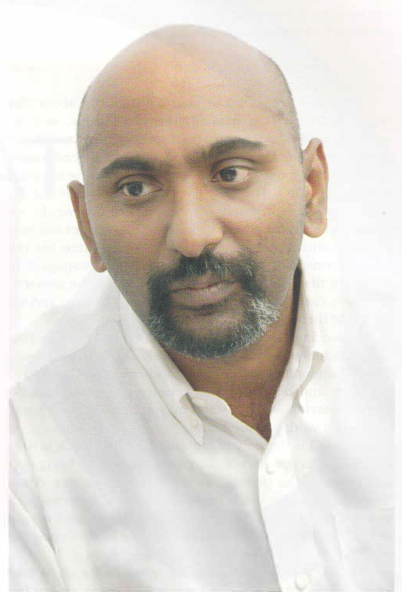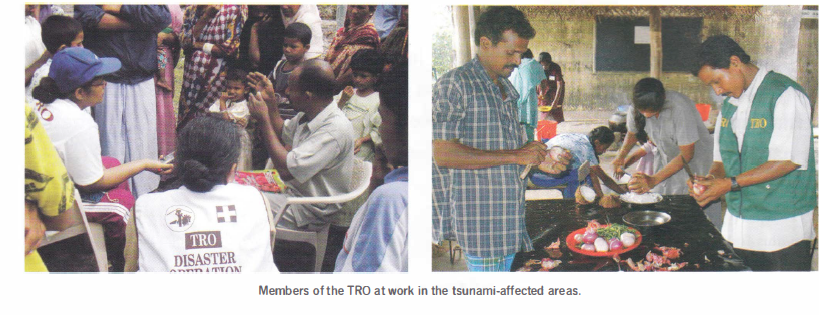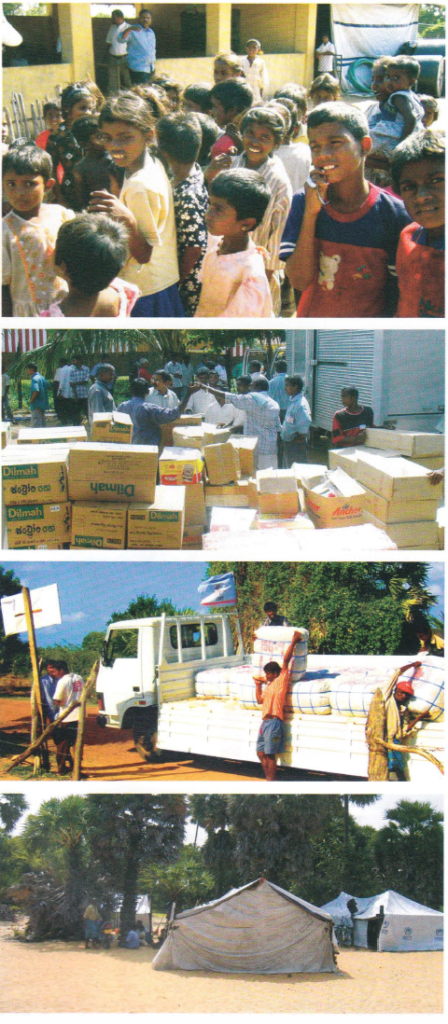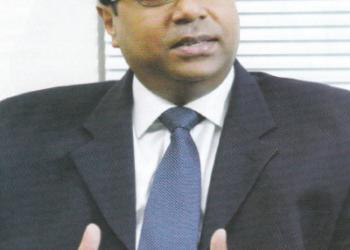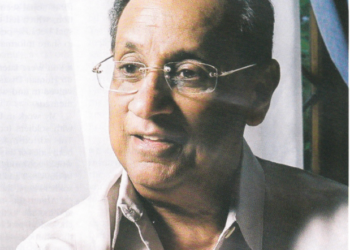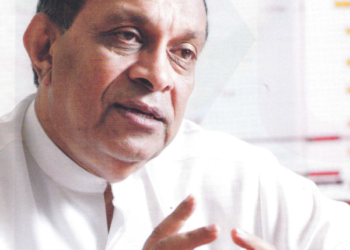The mission of the Tamils Rehabilitation Organisation (TRO), an effective Non-Governmental Organization (NGO), is to provide much needed relief, rehabilitation and development for the people of the northeast of Sri Lanka. The TRO’s head office is located in Kilinochchi and branch offices have been opened throughout the island. Furthermore, there is a network of TRO offices in several countries throughout the world.
Chandru Para-rajasingham has been working as the Program Director of the TRO for the past two years. Business Today met with him to learn about the effects of the devastating tsunami on the northeastern region of the island, what the TRO is doing in terms of rebuilding livelihoods and the NGO’s opinion on aid utilization, the Sri Lankan government’s strategy and the protracted peace process.
Para-rajasingham emphasizes that the support received by different people including citizens from the south, the Tamil diaspora and the international community is most encouraging.
By Rashmini Mather
Assisted by lshani Kuruppu
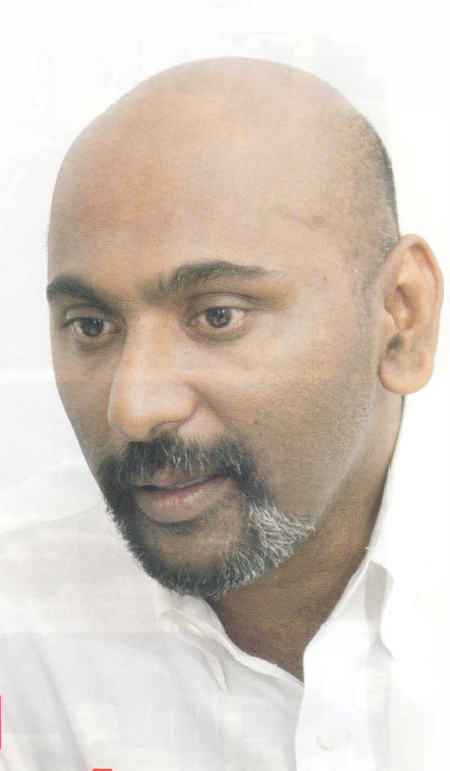
For the benefit of our readership. can you briefly tell us about the TRO?
The TRO was begun in 1985 in South India soon after the people started becoming displaced from the north of Sri Lanka due to the conflict between the government and the LTTE and other groups. Thus the TRO, a registered national NGO, was established to help refugees in South India cope with what they were faced with. In the late 1980s, the TRO office moved to Jaffna and was one of the only local NGOs to be involved in rehabilitation work during the war. In 1995 there was a huge displacement of about half a million people from Jaffna into the Wanni. The TRO was one of the primary NGOs that dealt with those Internally Displaced Persons (IDPs). From that per perspective had experience in dealing with immediate humanitarian disaster situation . The war was a man-made disaster while the tsunami was a natural disaster but they both affected the people.
Can you talk about the extent of the death and destruction caused by the tsunami in the northern and eastern areas?
The disaster shook all of us. We didn’t realize the impact of what had happened in the early stages. There was talk of 300 deaths, then 3,000 and then 30,000. Approximately 600 villages have been damaged in the northeast and >ver half a million people have been displaced. We were totally overwhelmed with what happened and we were all emotionally affected; we knew people who had died in the tsunami. Personally I don’t think I’ve been through such a long period of sadness. It is human tragedy, which cannot be explained in words. The statistics say that 70% of the damage from the tsunami was in the northeast. The TRO has offices in all eight districts of the northeast so we began to utilize that structure to deliver relief goods to those affected people as fast as possible.
The relief efforts in the north and east have been commended for their discipline and organization. Can you explain the work that the TRO has been involved with in this respect?
Since December 26, 2004, the TRO has been working around the clock to help the affected communities in the north and east. We concentrated on those areas because we knew that the death and destruction there was huge and there were limited supplies in the northeast to meet the needs of this kind of disaster. We immediately started dispatching relief items; on average 10 lorries per day, even now, are sent from our Colombo office to the north and east. We organized a disaster management team to coordinate the logistics and send support, supplies and personnel to the affected districts. One of our major concerns on the medical side was the break out of an epidemic like cholera but we made sure that all the preventive measures were taken. The overwhelming support we have received from here and overseas, with volunteers physically helping, is unbelievable. As you know, survivors of the tsunami walked into any nearby empty building like a church, temple, mosque or school. There were about 257 camps looked after by the TRO in the early days. ow it has been scaled down to about 97 camps. Within the first two weeks. we were planning the second phase and what we were hoping to achieve.
“Organizations like us will do everything in our scope to deliver and the people on the whole are committed. We are willing to work with anybody, the government or international support. We have no preference to work with any particular organization or particular section of the government, and they are supportive of what we do.”
We decided to set up temporary housing but we realized that the tents we were given were suitable for European climates and thus were too hot for the people to live in. Thus we built 180 square foot-cadjan sheds with cement floors and an iron frame that could house about five people. We wanted to ensure that this type of accommodation provides basic comfort because in our past experience with IDPs, we learned that although they are placed in temporary accommodation for the short term, this is not so. There are about 350.000 pre-tsunami IDPs living in temporary shelters and they have been doing so for the last 10-15 years. Everyone would like to say it is only for a short period but we know the practicalities, it’s going to be long; particularly with the new restrictions like the 100-meter buffer zone. There will be long legal battles. So by the time that is all resolved it could take almost a year before people start moving. I am being pessimistic based on past experience but I hope I am wrong and that people will be able to return home sooner. For the TRO’s work, we have received support and messages of congratulations from unexpected quarters. For instance the Jathika Hela Urumaya (JHC) made a comment saying that they were very pleased with the TRO”s work. So from that perspective, people appreciate our work and they know we are doing a good job. In this time of tragedy, we were also faced with frustration. In the early stages it looked like there was some sort of cooperation between the security forces and our people on the ground but it deteriorated and it was unfortunate. So we had to speak to the government to ensure that this was sorted out. The government did everything possible within their scope. In addition, we had continuous problems with the government authorities not. allowing us to clear relief goods like clothes, medical supplies, water purification systems etc, that had been donated to us. Since they were donations, we should not be paying VAT or duty on them. We had to go to the highest possible authority to obtain clearance. Even though the TRO is a registered national NGO, there was so much bureaucratic red tape, which we had to get through to get things sorted out.
The TRO has now inaugurated a Back-To-Work scheme to assist the fisher communities in those areas. Can you elaborate on this program and other efforts to rebuild the livelihoods of those affected?
‘Light of Hope’ is our theme, giving hope to the people. The concept is that people who have been earning a living have pride in their job. He is the provider for his family and does not want to be the recipient of charity because he has self-esteem. This is the case throughout the country, not only in the northeast. We do not want in any way to encourage them to become dependent. Admittedly some of them need a lot of social help so we have signed up with an organization called Action Aid who has experts on psychosocial aspects. We want to get people back into the work force. back into normalization. Most of them have lost their families, children and friends but they are resilient and say they want to return to pick up their lives. Many have the experience of being at the receiving end of a 20-year war. They were bystanders who were affected by it. The ·Back-To-Work’ program is for the fishermen because a majority of them and their families were affected by the tsunami. In the early clays, we were concerned about how the fishermen, who had been psychologically traumatized, would return to the sea to fish because Mother Nature that they were engaged with on a daily basis had in a sense, turned against them. But the collective response was they wanted our help to return to fish because that is their livelihood. That was encouraging. Through two cooperative societies, we have started providing fishing boats and fishing has begun. Our other main plan is the ·sponsor A Village’ program. There have been foreign agencies and other countries who have come aboard and said that they want to partner with the TRO. They want to sponsor the reconstruction of an entire village, which means providing everything required by an average village such as houses, a school, fishing boats, fishing nets. roads etc. Hopefully it will be better than what they had before. In addition. We believe that local people should be trained and employed to strengthen the process and to ensure some sort of sustainability. People from overseas will come for six months to a year and then go back. We need sustainability, local people trained to handle the situation. We are requesting for capacity building of our local employees, local NGOs and local Community Based Organizations (CBOs). After all if you want to ensure sustainability, the decisions have to come from the people. We cannot take decisions from Colombo or the TRO head office in Kilinochchi and say this is what we want to do. Decisions should be made on the people’s request. They should come to us and then we formulate something in consultation with them. For instance. the idea of using the cooperative system for the fishermen came from them. Organization. like us will do everything in our scope to deliYer and the people on the whole are committed. We are willing to work with anybody, the government or international support. We have no preference to work with any particular organization or particular section of the government, and they are supportive of what we do.
Is the TRO involved in the strategic planning for rebuilding of the north and east?
No we are not. There is a Planning and Development Secretariat which is based in Kilinochchi for that purpose. It has a plan and timeframe and we work within that framework. We, as an GO have schemes such as the ·Sponsor A Village’ program where we outline certain guidelines like how we want the houses to be built, the number of boars required ere. Bur at the end of the clay, it will be something that has to be worked our on a bigger scale where the government and the LTTE come to an arrangement on how things are going to be done properly in the northeast. The TRO is an NGO which has a huge capacity to deliver, but we do not have any mandate or intention of planning our towns and projects as a planning authority.
What is your assessment of the government’s approach thus far in the post-tsunami relief and reconstruction exercise?
I think the government was initially overwhelmed with what happened, just as we were. ,I don’t think any system was prepared to deal with such a disaster. There were so many quick decisions that were taken which they believed at that rime were the best. Bur these decisions were made in Colombo for people in Hambantora, Galle, Ampara, Batticaloa. Yala and Mullaitivu without their consultation. Unless there is consultation and discussion, with some sort of system where those people’s thoughts are incorporated, it is nor going to work. I feel the government has realized that and they are doing their best to understand the needs of the people. Since there was no government representation except for the Government Agents (GAs) in these districts. the government did not actually have a feedback mechanism to deal with it. You have to expect some of the shortcomings especially because the government did not have a very strong presence in the northeast. As a result of the war, the government does not have a strong delivery mechanism in the northeast. So even though the government may want to deliver essential items, the delivery mechanism does not have the capacity to assist those areas.
Has a working arrangement for the purpose of relief and recovery been agreed upon between the LTTE and the Government of Sri Lanka’
I believe currently there are certain unofficial concurrences and cooperation on some level between the government and the LTTE bur nothing has been formally agreed upon. I think this is a positive aspect. We hope that it will translate into something bigger where there is a better understanding, and an opportunity for them to work together. However, I wouldn’t be able to shed more light than what you have gathered from the media.
Sri Lanka has been the recipient of an enormous amount of international aid. Can you talk about the aid that the TRO has received?
As far as we are concerned, various individuals, organizations and foreign governments have given us funds and aid in goods. They trust the TRO has the capacity to deliver. We are also interested in the people and organizations that have a long-term commitment to be a part of a process that provides tangible benefits to communities. The Sri Lankan Government does nor have to provide funds to the TRO. The government provides funds to the GAs and they have their own delivery mechanism. We never requested the government to give us any funds. The government believes it has its own mechanism of delivering; unfortunately it is not the most efficient. Quire some funds have been raised privately and we hope this would be properly channeled to help the affected people to get their lives back to some level of normalcy. People do not need to live in fancy homes. We want them to have decent homes and have an income by way they can support their families, send their children to good schools and have something to be proud about. We don’t need a huge amount of money to achieve that. If the money is spent wisely and it is according to a proper plan. it will deliver much more than what people think it can.
There is a concern about promoting a culture of dependence as result of this aid entering the country How can we counteract that trend?
After the first week or so we started thinking about the aid dependency factor. There is a good possibility of people becoming dependent in such situation and we don’t want a society that is heavily dependent on handouts. That does not give them any self-esteem and any incentive to work. They certainly need relief and medical help so you cannot abandon them. We thought of these themes of hope, back to work and cooperation so that we strike a balance, which is to help them immediately as well as to later move to the next stage of self-help.
The TRO had several children’s homes in the northeast prior to the tsunami but since so many children have been affected, we will have to increase their capacity to deal with the influx. Ideally we would like members of their family to take care of them but whole families have died and only some children have escaped. We cannot abandon them. You have to understand that these affected people are totally insecure. This would be the case for anyone of us. Everything is lost – their savings, homes, families and friends. Now, whatever we give them is all that they have – a shelter or a shirt. We cannot expect them to be self-confident that they can get their life back together. At the same time we need to help them get back on their feet because it is for their own good, and for our good as well because we cannot continue to support them for an indefinite period of time. We believe that we have a sound understanding but the next few months will reveal how good our programs are.
“In ten years time, I would like Sri Lanka to be totally self-reliant and have a standard of living, which is good for us, in line with our country’s family culture and our beliefs in education and with the least amount of antagonism towards the differences we have with respect to race and religion.”
It must be a difficult situation for the IDPs as a result of the ethnic conflict to see so much assistance being given for the post-tsunami JDPs?
Pre-tsunami, I believe there were 350,000 IDPs. The TRO is one of the biggest de-mining agencies in the northeast and we have close to 1,000 de-miners working so we are well aware of the clangers. People cannot return to their homes due to the land mines and High Security Zones (HSZs). We find that they have been left out. There has been some noise made by the UNHCR and others about this. I hope that it will convert into something tangible for them and that these people do not get discriminated against. There are people affected in the tsunami who were already IDPs because of the war. These people have suffered greatly in the last 20 years. They say they have experienced two tsunamis. It is a natural human tendency to feel some resentment. Such feelings are understandable; just imagine if you were a pre-tsunami IDP and I was a tsunami survivor and I get all the attention. There are people coming in white vehicles, NGOs and overseas visitors offering to help me, and you are sitting in a refugee camp a few kilometers away but nobody cares about you. It is only natural for them to feel that they should have gone with the tsunami or maybe they should have been affected so that they have a better chance of getting something back. Due to the peace process coming to a standstill and everything else not moving forward. these people have been neglected for the last three years of the ceasefire. They have a genuine grievance which needs to be addressed, and they need to be incorporated as part of the tsunami reconstruction process. They cannot be left behind as it will be a frustration, which could lead to social upheaval. The government is fully aware of the situation but the HSZs are a politically sensitive issue. We are mindful there are some issues, which cannot be resolved overnight but we want to ensure that the world does not forget these people who have suffered greatly.
Do you have any comments about the recent criticisms stated in the local media about the TRO?
There has been a lot of negative publicity about this organization recently. Basically this is a vicious, well-organized, worldwide campaign that is being carried out at the moment; there people are writing to embassies, countries, shipping agents etc, saying not to send relief items to the TRO. The TRO has been in Colombo for the last two-and-a-half years but over the last few weeks we have been accused of every possible crime under the sun. The allegations are unsubstantiated and written for the sake of consumption. These are national newspapers in the south that are more interested in selling the newspapers than carrying honest news. They are divisive and we have told them that. We are frustrated and saddened as this is nor the best way to achieve peace. Simultaneously it has strengthened Tamil communities in Sri Lanka and overseas. They have lost hope and belief that this country can deliver justice. They are saying: we will stand by you, the TRO; we know what good work you are doing. The TRO is the only organization locally which is fully focused, from the start of the peace process, to bring normalization to the people. We did not wait for any donor funding. We found funds from the diaspora, agencies such as UNICEF, and whoever would work with us, and we did our work. We as an organization believe in delivering the peace dividends rather than only talking about it. We feel that there are enough grounds for us to take legal action against some of these media organizations because they are unsubstantiated allegations. \Y/e are thinking of doing it but at the moment we’re concentrating on relief work and getting people back to some sort of normalization. We do nor wish to waste our time and energy countering these attacks. I think our attackers are threatened because they feel we are delivering. We are providing relief items, clearing debris and starting to rebuild livelihoods, and they feel threatened by it. If we were doing a bad job, I don’t think they would care about us; they would leave us alone. Sometimes success is a threat and people do everything possible to harm it. We will stomach that and deliver at the end of the day.
The tsunami disaster is being viewed as an opportunity to recommence a dialogue between the I.TTE and the Government of Sri Lanka, which may then lead to reinitiating the peace negotiations. What are your views?
There has been a connection made between communities because the tsunami did not discriminate: it affected the east. southeast and south coasts. Many ordinary citizens. Buddhist priests and politicians from the south came with relief goods to the north. It has helped those affected northeast communities feel that the average person in this country has understood their plight. I think their sincerity has touched tho e people in the northeast, including, I believe the LTTE. I feel that is a positive move for the peace process and it is a turning point in some ways. There is a general sentiment that something good could come out of the tsunami. that there could be a system of work between the LTTE and the government for aid distribution and the implementation of projects etc. If there is no proper structure, the TRO will continue to have bureaucratic problems and frustration to deal with and it will put a lot of things behind, including the peace process. This is the most conflict sensitive environment. The people in the northeast still feel that there are bureaucratic government establishments that deliberately do nor want to deliver. There is frustration. There shouldn’t be a system where the central government controls everything as it will have a negative impact on the future of these people. At the end of the day, it is fundamental that the peace process is not forgotten. This is basically an opportunity to get the peace process moving. I hope that both sides and the international community will rake this as a cue to move it forward. In this system of globalization, the international community has a huge role to play and I believe they would play a positive role. The donor countries say that we need to take the peace process forward. I hope that the politics of this country would be mature and sensitive, and make a genuine commitment to take it forward. Our hope is for the dialogue between the two groups to start as soon as possible.
Where would you like to see Sri Lanka In ten years time?
In ten years time, I would like Sri Lanka to be totally self-reliant and have a standard of living, which is good for us, in line with our country’s family culture and our beliefs in education and with the least amount of antagonism towards the differences we have with respect to race and religion. I don’r believe that we need to have a standard of living like another country. The TRO believes that it can play a big role in this vision. Over the past weeks, we have made many friends in the south for the work we have done. We’re also hoping we could do some work in the south but it has to be a substantial project rather than a token gesture. Hopefully, in ten years time, there won’t be IDPs in this country. I hope there won’t be refugees in parts of the world waiting anxiously to know whether they’re going to be deported or not. I would like for people to travel freely around the country and where children are able to talk to each other whatever race they belong to. There is a genuine understanding and we have moved forward into a country like South Africa, which transformed from a conflict environment. I am optimistic and the TRO is optimistic. Some of us wouldn’t be here if we weren’t optimistic. It is easy to be outside and criticise what is going on but is vital to be a part of the process. It cannot change overnight. You can’t restore belief and confidence just because politicians or people like us say you should. It is what the people see through delivery mechanisms that make them trust the process. I hope we don’t have to wait 10 years to achieve this. That is the hope of the TRO and my personal hope as well.
